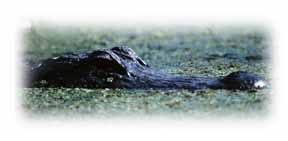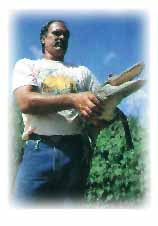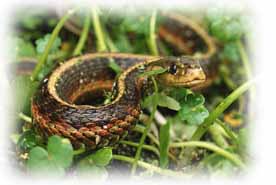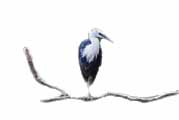hatching and releasing up to a million gators and crocs back into their natural habitats. Once the census of wild reptiles was stable, the farmers could then do what farmers usually do -raise and "harvest" their crop.
 Being cold-blooded, all reptiles are very sensitive to changes in temperature. An alligator's life begins in March or April, when the swamp begins to warm from its winter chill and the gators are roused from their long hours of dreamless sleep.
Being cold-blooded, all reptiles are very sensitive to changes in temperature. An alligator's life begins in March or April, when the swamp begins to warm from its winter chill and the gators are roused from their long hours of dreamless sleep.
They have one thing on their mind, and engage in it at every opportunity. The females then build nests and produce up to 50 eggs each. In the wild, only two of these eggs would become adults. Alligators and alligator eggs are tasty morsels to many of the animals who themselves become tasty morsels to grown alligators.
Mother gators in the swamp do their dimwitted best to nurture their hatchlings, and the few who survive remain with her until they're three years old, when they become competition. At the Everglades Farm, gator eggs are collected by the intrepid farmers, who scour the hammocks in teams of two - one to hunt for eggs, the other to watch out for the mother alligator.
best to nurture their hatchlings, and the few who survive remain with her until they're three years old, when they become competition. At the Everglades Farm, gator eggs are collected by the intrepid farmers, who scour the hammocks in teams of two - one to hunt for eggs, the other to watch out for the mother alligator.
The eggs go to a hatchery on the farm. The Thibots can control the gender of the alligators they hatch. Cooler temperatures produce females; turn up the heat and you've got males. Virtually all of the eggs hatch.
Newborn alligators stay warm and wet in a series of growout pens, similar to those used by fish hatcheries. Visitors can watch alligators and crocodiles in various stages of growth, and lounging in these pens like contented sunbathers on a crowded Florida beach, smiling enigmatic smiles. The Thibots can smile, too. A full-grown alligator can bring up to $600 after processing.
 Like other safari parks, the Everglades Farm offers educational shows and an exciting guided tour. The shows are part of the ticket price; the 45-minute airboat ride into the gator- and snake-infested waters of the swamp is a little extra, but well worth it.
Like other safari parks, the Everglades Farm offers educational shows and an exciting guided tour. The shows are part of the ticket price; the 45-minute airboat ride into the gator- and snake-infested waters of the swamp is a little extra, but well worth it.
Like all good teachers, Debbie Thibot understands the value of hands-on experiences, and the shows reflect this. In the alligator show, the demonstrator drags, coaxes and cajoles gators and American crocodiles into performing for the fascinated audience. He engages in a wrestling match with a lively, full-grown gator. The work is dangerous, because alligators have a brain about half the size of a human thumbnail and are therefore untamable. Driven by instinct alone, an active alligator can chomp down its toothy jaws with a grim 3,000 pound snap on anything it pleases--soda can, chicken wing, human arm...Visitors can hold a small gator whose mouth has been temporarily taped shut.
 The snake show is fun, too, although not entirely relevant to the Everglades, since some of the snakes are from out of the area. However, snakes are also reptiles, and much of what is true for them is true for alligators. More highly evolved than the gators, snakes make better pets. The Everglades are crawling with them, and four poisonous kinds make their home there. America's most venomous viper, the coral snake, is there, along with cottonmouth watermocassins and two varieties of rattlesnake.
The snake show is fun, too, although not entirely relevant to the Everglades, since some of the snakes are from out of the area. However, snakes are also reptiles, and much of what is true for them is true for alligators. More highly evolved than the gators, snakes make better pets. The Everglades are crawling with them, and four poisonous kinds make their home there. America's most venomous viper, the coral snake, is there, along with cottonmouth watermocassins and two varieties of rattlesnake.
 The airboat ride is a high-speed, noisy flight over a maze of narrow, shallow channels that meander through the swamp. The driver (mine was a well-informed naturalist named Louis who was moonlighting from his job as a photography professor) pilots the boat to several stops along the way by making 360-degree turns on wider sections of the waterway. Many varieties of birds find refuge here, and morning visitors can find themselves parked by flocks numbering well into the hundreds, especially on winter mornings. The animals of the swamp have no fear of the airboat and swim right up to it, so it's wise to keep your hands out of the water.
The airboat ride is a high-speed, noisy flight over a maze of narrow, shallow channels that meander through the swamp. The driver (mine was a well-informed naturalist named Louis who was moonlighting from his job as a photography professor) pilots the boat to several stops along the way by making 360-degree turns on wider sections of the waterway. Many varieties of birds find refuge here, and morning visitors can find themselves parked by flocks numbering well into the hundreds, especially on winter mornings. The animals of the swamp have no fear of the airboat and swim right up to it, so it's wise to keep your hands out of the water.
 Back on dry land, visitors can watch the alligators dine (mmm, tastes like chicken). There's also a small zoo-like exhibit of animals who have come to the Everglades Farm for refuge. Two declawed panthers who were once the household pets of a drug lord, occupy one large cage. (Presumably their former owner occupies one elsewhere.) There are also two lynxes and a large, orphaned black bear named Josh, who is fond of bathing and watching all the interesting people who come to see him.
Back on dry land, visitors can watch the alligators dine (mmm, tastes like chicken). There's also a small zoo-like exhibit of animals who have come to the Everglades Farm for refuge. Two declawed panthers who were once the household pets of a drug lord, occupy one large cage. (Presumably their former owner occupies one elsewhere.) There are also two lynxes and a large, orphaned black bear named Josh, who is fond of bathing and watching all the interesting people who come to see him.
Perhaps he'll see you at the Everglades Alligator Farm.

EVERGLADES ALLIGATOR FARM
Box 907, Homestead, Florida 33090
40351 S.W. 192 Ave, Homestead Florida 33034
(305) 247-2628 fax (305) 248-9711
Directions: From Miami, take Florida's Turnpike to the end in Florida City. Go right at Palm Drive, left at S.W. 192 Ave., go 4 miles.
